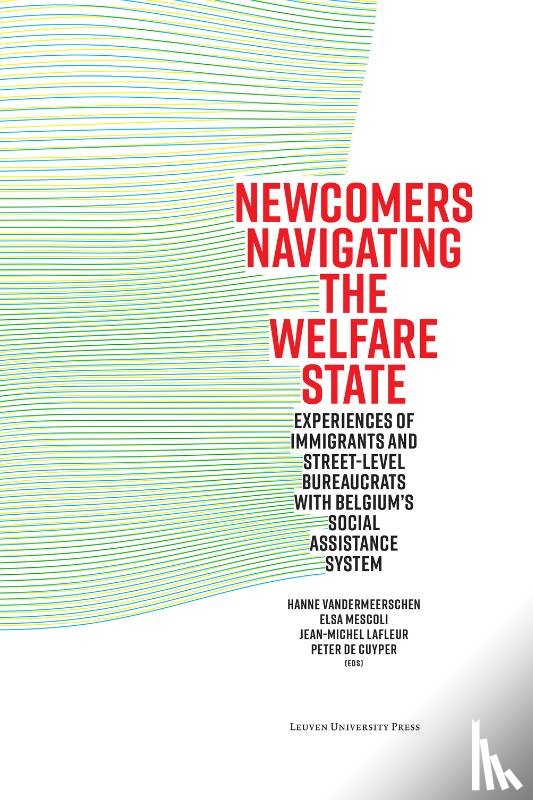Omschrijving
The needs of newcomers and the provided social assistance. The topic of social assistance for migrant newcomers often sparks heated public debate and remains a prominent concern on the policy agenda. Society – including the target groups of welfare institutions – has experienced a growing level of diversity. This reality gives rise to new demands and changing profiles of individuals who benefit from welfare services. Welfare institutions, which are responsible for providing social assistance, play a crucial role in granting access to social benefits for newcomers. Moreover, the provision of social assistance can significantly influence the settlement and integration processes of migrants.
This book provides empirical insights into the alignment between the needs of newcomers and the service provided to them. It examines the accessibility of social assistance for newcomers from a comprehensive perspective, encompassing aspects such as gaining access (including equal access for all) and service availability, as well as the suitability of these services. By focusing on the Belgian Public Centres for Social Welfare as a case study, the authors explore the policies and practices related to social assistance and labour market activation for newcomers and the factors that influence individuals’ access to their rights.
By incorporating the perspectives of all the relevant stakeholders involved, drawing on the insights of social workers and managers as well as the experiences of newcomers themselves, this book offers a unique understanding of the interactions between immigrants, the welfare state, and street-level bureaucracy. It provides valuable insights for enhancing service provision, striving for a more inclusive approach. The topic of social assistance for migrant newcomers often sparks heated public debate and remains a prominent concern on the policy agenda. Society – including the target groups of welfare institutions – has experienced a growing level of diversity. This reality gives rise to new demands and changing profiles of individuals who benefit from welfare services. Welfare institutions, which are responsible for providing social assistance, play a crucial role in granting access to social benefits for newcomers. Moreover, the provision of social assistance can significantly influence the settlement and integration processes of migrants.
This book provides empirical insights into the alignment between the needs of newcomers and the service provided to them. It examines the accessibility of social assistance for newcomers from a comprehensive perspective, encompassing aspects such as gaining access (including equal access for all) and service availability, as well as the suitability of these services. By focusing on the Belgian Public Centres for Social Welfare as a case study, the authors explore the policies and practices related to social assistance and labour market activation for newcomers and the factors that influence individuals’ access to their rights.
By incorporating the perspectives of all the relevant stakeholders involved, drawing on the insights of social workers and managers as well as the experiences of newcomers themselves, this book offers a unique understanding of the interactions between immigrants, the welfare state, and street-level bureaucracy. It provides valuable insights for enhancing service provision, striving for a more inclusive approach. Introduction
Elsa Mescoli and Jean-Michel Lafleur
Chapter 1. Conceptualising immigrants’ access to social assistance and their interaction with street-level bureaucrats
Roberta Perna and Hanne Vandermeerschen
Chapter 2. Social assistance bureaucracies and new migrants: the Belgian context
Abraham Franssen
Chapter 3. Applying mixed-method design in the study of immigrant social protection
Elsa Mescoli, Angeliki Konstantinidou, Marije Reidsma and Jérémy Mandin
PART I. Social assistance for newly arrived immigrants
Chapter 4. Explaining variations in forms of service delivery for newcomers
Elsa Mescoli, Hanne Vandermeerschen, Adriana Costa Santos and Carla Mascia
Chapter 5. Understanding challenges and pitfalls in the service delivery to newly arrived immigrants
Adriana Costa Santos, Hanne Vandermeerschen and Elsa Mescoli
Chapter 6. Labour market activation and newly arrived immigrants
Hanne Vandermeerschen, Adriana Costa Santos and Elsa Mescoli
Conclusion Part I
Hanne Vandermeerschen
PART II. Policy in practice: the decision-making process
Introduction
Elsa Mescoli
Chapter 7. The allocation of social assistance as a hierarchised decision-making process
Elsa Mescoli and Hanne Vandermeerschen
Chapter 8. The discretion of social workers towards newly arrived migrants
Elsa Mescoli
Conclusion Part II
Elsa Mescoli
PART III. Accessing welfare services in Belgium: the perspective of newly arrived immigrants
Chapter 9. Pathways of access: analysing newly arrived immigrants’ access to welfare services
Marije Reidsma and Michelle Crijns
Chapter 10. The newcomers’ perception of social assistance provision and its organisation
Adriana Costa Santos and Youri Lou Vertongen
Chapter 11. Developing forms of agency: how do newcomers deal with social services
Jérémy Mandin
Conclusion Part III
Jérémy Mandin
Part IV. Conclusion
Hanne Vandermeerschen and Peter De Cuyper
About the authors


